Ethical Dilemmas in Nursing: Case Analysis & Evidence Portfolio
VerifiedAdded on 2023/06/10
|22
|5934
|348
Portfolio
AI Summary
This assignment consists of a formative assessment vignette and a portfolio of evidence focusing on ethical issues in nursing practice. The vignette describes a clinical scenario where an elderly patient with dementia was administered antipsychotic medication without proper consent, raising concerns about patient autonomy, non-maleficence, and justice. The portfolio expands on this scenario, reflecting on the ethical principles violated and the importance of upholding patient rights. The portfolio includes an introduction to the topic, a detailed reflection on the ethical dilemma, and an analysis of relevant legal and professional issues. The assignment highlights the need for nurses to prioritize patient well-being, respect their autonomy, and adhere to ethical codes of conduct in their practice. The assignment is available on Desklib, a platform offering a wide range of study resources for students.
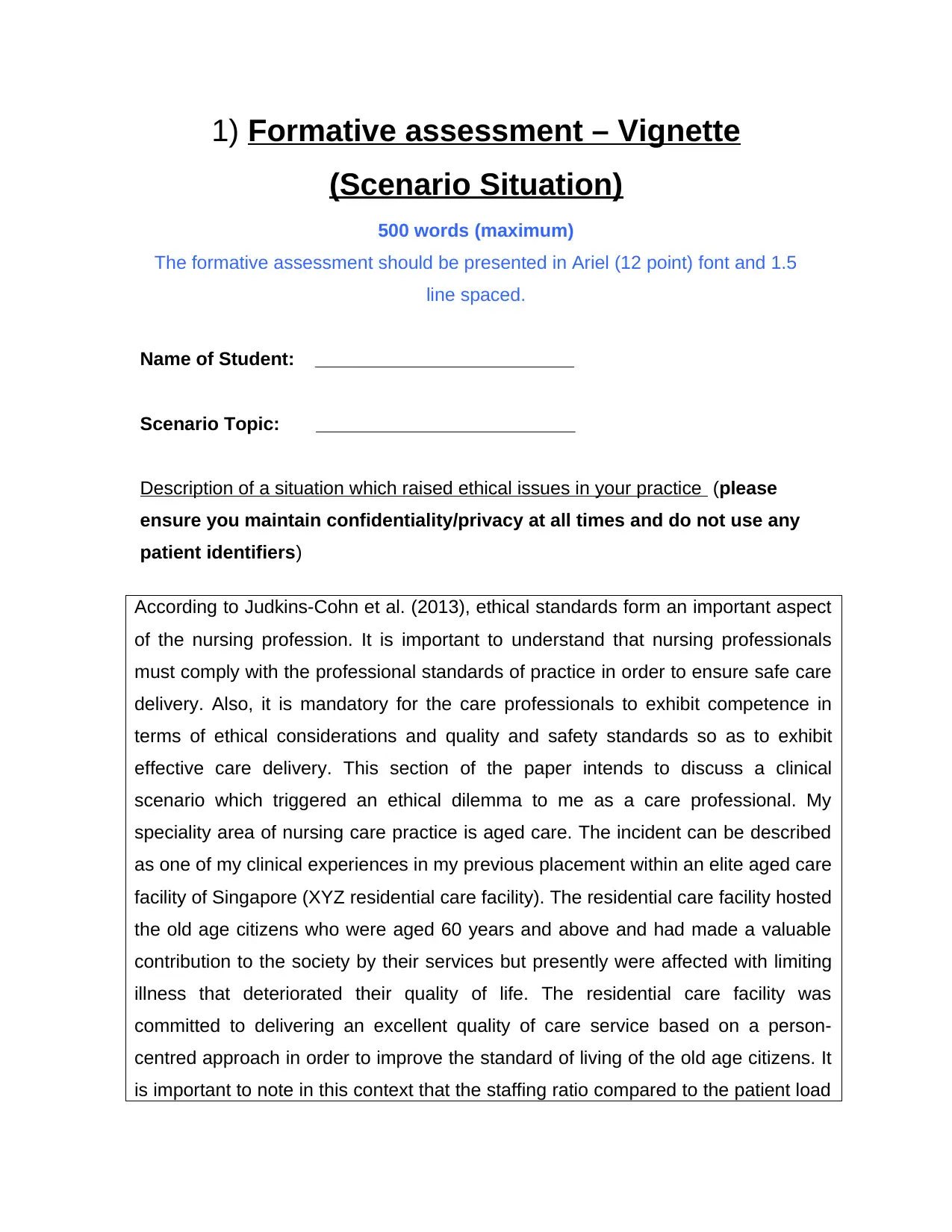
1) Formative assessment – Vignette
(Scenario Situation)
500 words (maximum)
The formative assessment should be presented in Ariel (12 point) font and 1.5
line spaced.
Name of Student: _________________________
Scenario Topic: _________________________
Description of a situation which raised ethical issues in your practice (please
ensure you maintain confidentiality/privacy at all times and do not use any
patient identifiers)
According to Judkins-Cohn et al. (2013), ethical standards form an important aspect
of the nursing profession. It is important to understand that nursing professionals
must comply with the professional standards of practice in order to ensure safe care
delivery. Also, it is mandatory for the care professionals to exhibit competence in
terms of ethical considerations and quality and safety standards so as to exhibit
effective care delivery. This section of the paper intends to discuss a clinical
scenario which triggered an ethical dilemma to me as a care professional. My
speciality area of nursing care practice is aged care. The incident can be described
as one of my clinical experiences in my previous placement within an elite aged care
facility of Singapore (XYZ residential care facility). The residential care facility hosted
the old age citizens who were aged 60 years and above and had made a valuable
contribution to the society by their services but presently were affected with limiting
illness that deteriorated their quality of life. The residential care facility was
committed to delivering an excellent quality of care service based on a person-
centred approach in order to improve the standard of living of the old age citizens. It
is important to note in this context that the staffing ratio compared to the patient load
(Scenario Situation)
500 words (maximum)
The formative assessment should be presented in Ariel (12 point) font and 1.5
line spaced.
Name of Student: _________________________
Scenario Topic: _________________________
Description of a situation which raised ethical issues in your practice (please
ensure you maintain confidentiality/privacy at all times and do not use any
patient identifiers)
According to Judkins-Cohn et al. (2013), ethical standards form an important aspect
of the nursing profession. It is important to understand that nursing professionals
must comply with the professional standards of practice in order to ensure safe care
delivery. Also, it is mandatory for the care professionals to exhibit competence in
terms of ethical considerations and quality and safety standards so as to exhibit
effective care delivery. This section of the paper intends to discuss a clinical
scenario which triggered an ethical dilemma to me as a care professional. My
speciality area of nursing care practice is aged care. The incident can be described
as one of my clinical experiences in my previous placement within an elite aged care
facility of Singapore (XYZ residential care facility). The residential care facility hosted
the old age citizens who were aged 60 years and above and had made a valuable
contribution to the society by their services but presently were affected with limiting
illness that deteriorated their quality of life. The residential care facility was
committed to delivering an excellent quality of care service based on a person-
centred approach in order to improve the standard of living of the old age citizens. It
is important to note in this context that the staffing ratio compared to the patient load
Paraphrase This Document
Need a fresh take? Get an instant paraphrase of this document with our AI Paraphraser
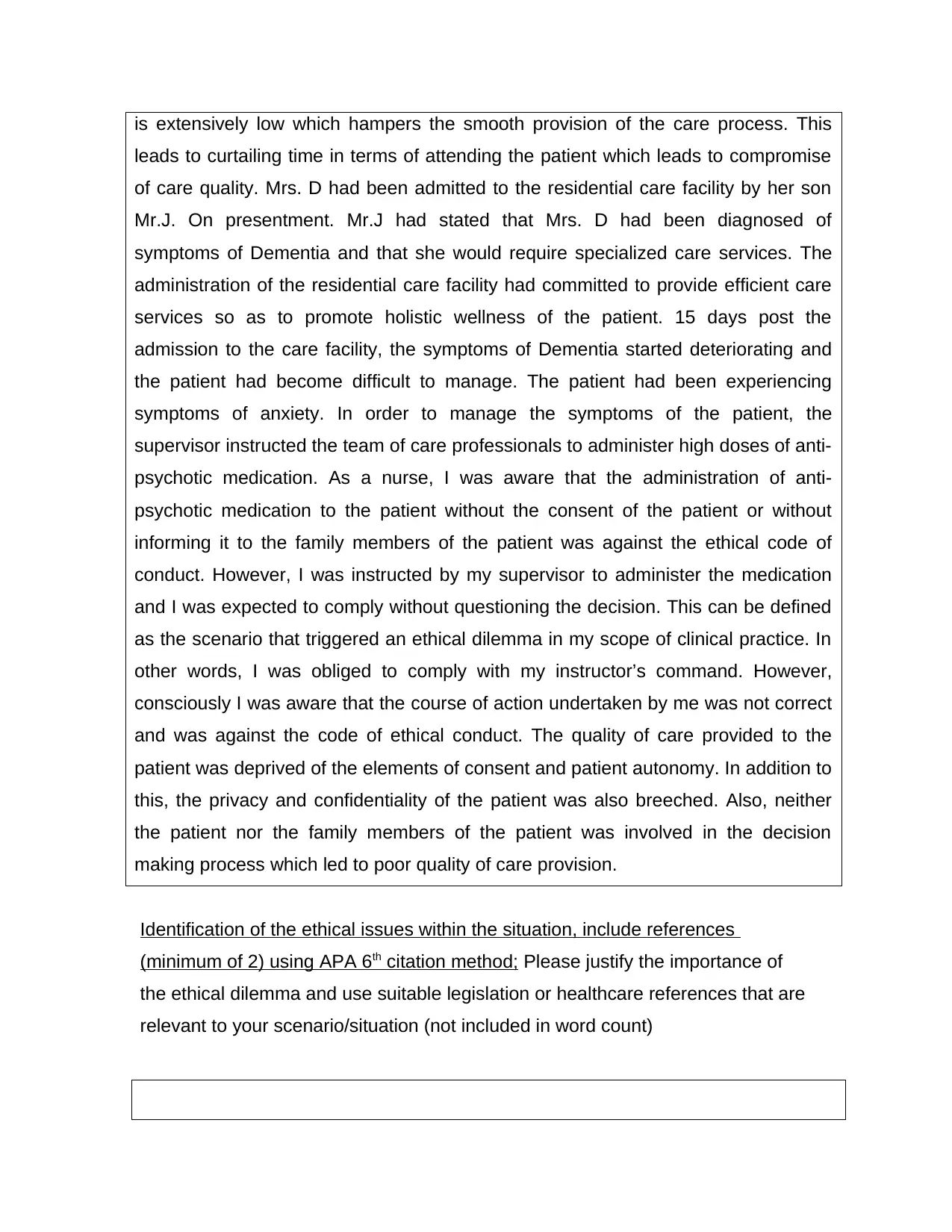
is extensively low which hampers the smooth provision of the care process. This
leads to curtailing time in terms of attending the patient which leads to compromise
of care quality. Mrs. D had been admitted to the residential care facility by her son
Mr.J. On presentment. Mr.J had stated that Mrs. D had been diagnosed of
symptoms of Dementia and that she would require specialized care services. The
administration of the residential care facility had committed to provide efficient care
services so as to promote holistic wellness of the patient. 15 days post the
admission to the care facility, the symptoms of Dementia started deteriorating and
the patient had become difficult to manage. The patient had been experiencing
symptoms of anxiety. In order to manage the symptoms of the patient, the
supervisor instructed the team of care professionals to administer high doses of anti-
psychotic medication. As a nurse, I was aware that the administration of anti-
psychotic medication to the patient without the consent of the patient or without
informing it to the family members of the patient was against the ethical code of
conduct. However, I was instructed by my supervisor to administer the medication
and I was expected to comply without questioning the decision. This can be defined
as the scenario that triggered an ethical dilemma in my scope of clinical practice. In
other words, I was obliged to comply with my instructor’s command. However,
consciously I was aware that the course of action undertaken by me was not correct
and was against the code of ethical conduct. The quality of care provided to the
patient was deprived of the elements of consent and patient autonomy. In addition to
this, the privacy and confidentiality of the patient was also breeched. Also, neither
the patient nor the family members of the patient was involved in the decision
making process which led to poor quality of care provision.
Identification of the ethical issues within the situation, include references
(minimum of 2) using APA 6th citation method; Please justify the importance of
the ethical dilemma and use suitable legislation or healthcare references that are
relevant to your scenario/situation (not included in word count)
leads to curtailing time in terms of attending the patient which leads to compromise
of care quality. Mrs. D had been admitted to the residential care facility by her son
Mr.J. On presentment. Mr.J had stated that Mrs. D had been diagnosed of
symptoms of Dementia and that she would require specialized care services. The
administration of the residential care facility had committed to provide efficient care
services so as to promote holistic wellness of the patient. 15 days post the
admission to the care facility, the symptoms of Dementia started deteriorating and
the patient had become difficult to manage. The patient had been experiencing
symptoms of anxiety. In order to manage the symptoms of the patient, the
supervisor instructed the team of care professionals to administer high doses of anti-
psychotic medication. As a nurse, I was aware that the administration of anti-
psychotic medication to the patient without the consent of the patient or without
informing it to the family members of the patient was against the ethical code of
conduct. However, I was instructed by my supervisor to administer the medication
and I was expected to comply without questioning the decision. This can be defined
as the scenario that triggered an ethical dilemma in my scope of clinical practice. In
other words, I was obliged to comply with my instructor’s command. However,
consciously I was aware that the course of action undertaken by me was not correct
and was against the code of ethical conduct. The quality of care provided to the
patient was deprived of the elements of consent and patient autonomy. In addition to
this, the privacy and confidentiality of the patient was also breeched. Also, neither
the patient nor the family members of the patient was involved in the decision
making process which led to poor quality of care provision.
Identification of the ethical issues within the situation, include references
(minimum of 2) using APA 6th citation method; Please justify the importance of
the ethical dilemma and use suitable legislation or healthcare references that are
relevant to your scenario/situation (not included in word count)
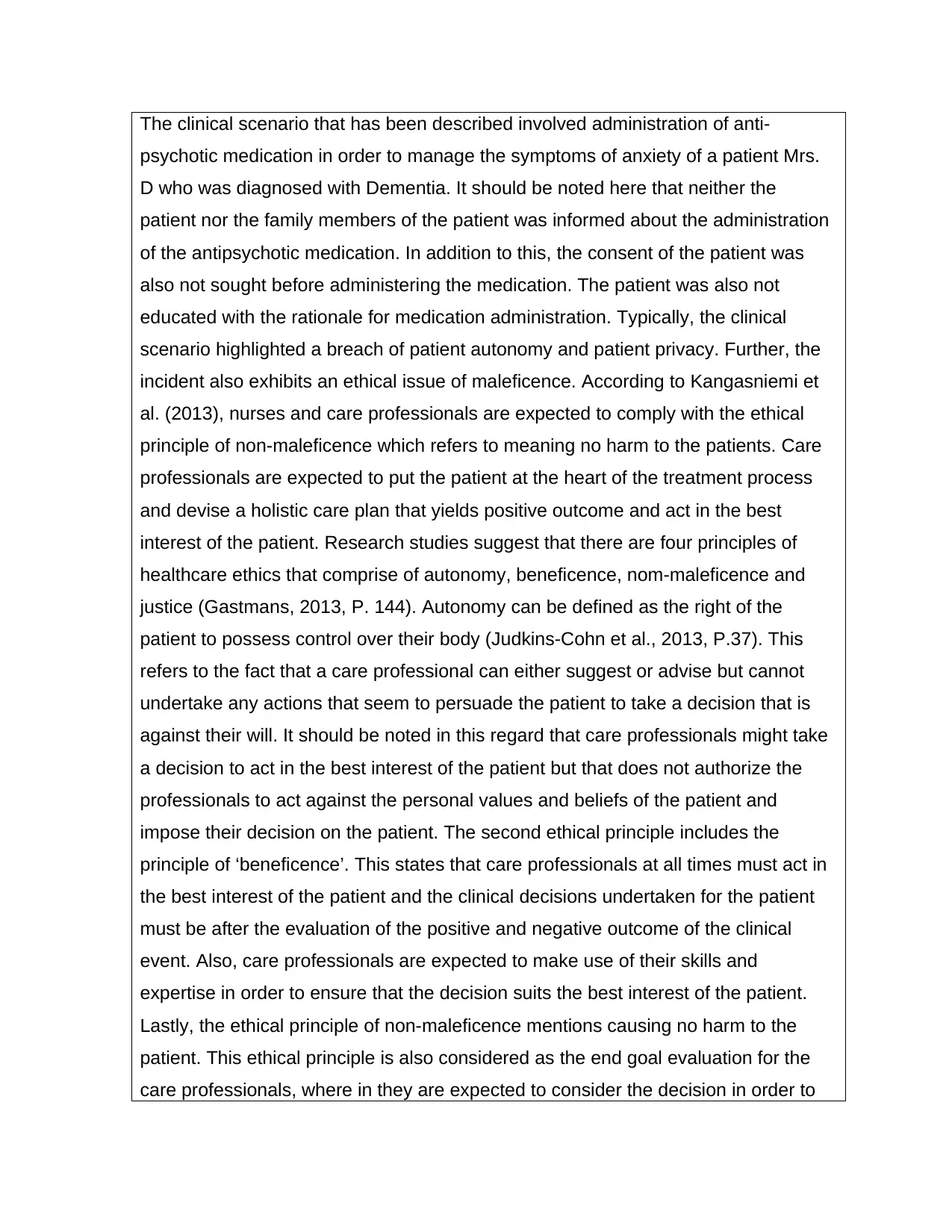
The clinical scenario that has been described involved administration of anti-
psychotic medication in order to manage the symptoms of anxiety of a patient Mrs.
D who was diagnosed with Dementia. It should be noted here that neither the
patient nor the family members of the patient was informed about the administration
of the antipsychotic medication. In addition to this, the consent of the patient was
also not sought before administering the medication. The patient was also not
educated with the rationale for medication administration. Typically, the clinical
scenario highlighted a breach of patient autonomy and patient privacy. Further, the
incident also exhibits an ethical issue of maleficence. According to Kangasniemi et
al. (2013), nurses and care professionals are expected to comply with the ethical
principle of non-maleficence which refers to meaning no harm to the patients. Care
professionals are expected to put the patient at the heart of the treatment process
and devise a holistic care plan that yields positive outcome and act in the best
interest of the patient. Research studies suggest that there are four principles of
healthcare ethics that comprise of autonomy, beneficence, nom-maleficence and
justice (Gastmans, 2013, P. 144). Autonomy can be defined as the right of the
patient to possess control over their body (Judkins-Cohn et al., 2013, P.37). This
refers to the fact that a care professional can either suggest or advise but cannot
undertake any actions that seem to persuade the patient to take a decision that is
against their will. It should be noted in this regard that care professionals might take
a decision to act in the best interest of the patient but that does not authorize the
professionals to act against the personal values and beliefs of the patient and
impose their decision on the patient. The second ethical principle includes the
principle of ‘beneficence’. This states that care professionals at all times must act in
the best interest of the patient and the clinical decisions undertaken for the patient
must be after the evaluation of the positive and negative outcome of the clinical
event. Also, care professionals are expected to make use of their skills and
expertise in order to ensure that the decision suits the best interest of the patient.
Lastly, the ethical principle of non-maleficence mentions causing no harm to the
patient. This ethical principle is also considered as the end goal evaluation for the
care professionals, where in they are expected to consider the decision in order to
psychotic medication in order to manage the symptoms of anxiety of a patient Mrs.
D who was diagnosed with Dementia. It should be noted here that neither the
patient nor the family members of the patient was informed about the administration
of the antipsychotic medication. In addition to this, the consent of the patient was
also not sought before administering the medication. The patient was also not
educated with the rationale for medication administration. Typically, the clinical
scenario highlighted a breach of patient autonomy and patient privacy. Further, the
incident also exhibits an ethical issue of maleficence. According to Kangasniemi et
al. (2013), nurses and care professionals are expected to comply with the ethical
principle of non-maleficence which refers to meaning no harm to the patients. Care
professionals are expected to put the patient at the heart of the treatment process
and devise a holistic care plan that yields positive outcome and act in the best
interest of the patient. Research studies suggest that there are four principles of
healthcare ethics that comprise of autonomy, beneficence, nom-maleficence and
justice (Gastmans, 2013, P. 144). Autonomy can be defined as the right of the
patient to possess control over their body (Judkins-Cohn et al., 2013, P.37). This
refers to the fact that a care professional can either suggest or advise but cannot
undertake any actions that seem to persuade the patient to take a decision that is
against their will. It should be noted in this regard that care professionals might take
a decision to act in the best interest of the patient but that does not authorize the
professionals to act against the personal values and beliefs of the patient and
impose their decision on the patient. The second ethical principle includes the
principle of ‘beneficence’. This states that care professionals at all times must act in
the best interest of the patient and the clinical decisions undertaken for the patient
must be after the evaluation of the positive and negative outcome of the clinical
event. Also, care professionals are expected to make use of their skills and
expertise in order to ensure that the decision suits the best interest of the patient.
Lastly, the ethical principle of non-maleficence mentions causing no harm to the
patient. This ethical principle is also considered as the end goal evaluation for the
care professionals, where in they are expected to consider the decision in order to
⊘ This is a preview!⊘
Do you want full access?
Subscribe today to unlock all pages.

Trusted by 1+ million students worldwide
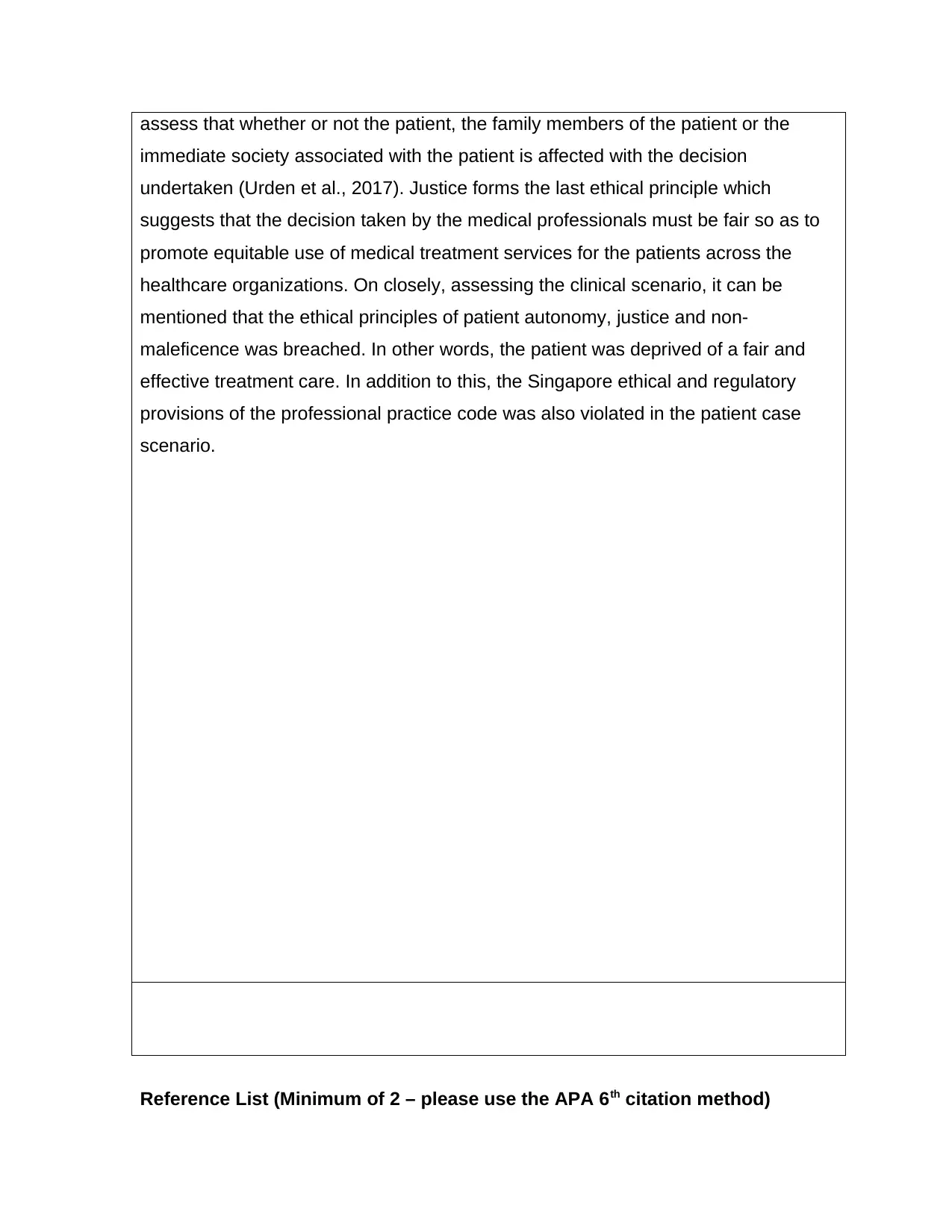
assess that whether or not the patient, the family members of the patient or the
immediate society associated with the patient is affected with the decision
undertaken (Urden et al., 2017). Justice forms the last ethical principle which
suggests that the decision taken by the medical professionals must be fair so as to
promote equitable use of medical treatment services for the patients across the
healthcare organizations. On closely, assessing the clinical scenario, it can be
mentioned that the ethical principles of patient autonomy, justice and non-
maleficence was breached. In other words, the patient was deprived of a fair and
effective treatment care. In addition to this, the Singapore ethical and regulatory
provisions of the professional practice code was also violated in the patient case
scenario.
Reference List (Minimum of 2 – please use the APA 6th citation method)
immediate society associated with the patient is affected with the decision
undertaken (Urden et al., 2017). Justice forms the last ethical principle which
suggests that the decision taken by the medical professionals must be fair so as to
promote equitable use of medical treatment services for the patients across the
healthcare organizations. On closely, assessing the clinical scenario, it can be
mentioned that the ethical principles of patient autonomy, justice and non-
maleficence was breached. In other words, the patient was deprived of a fair and
effective treatment care. In addition to this, the Singapore ethical and regulatory
provisions of the professional practice code was also violated in the patient case
scenario.
Reference List (Minimum of 2 – please use the APA 6th citation method)
Paraphrase This Document
Need a fresh take? Get an instant paraphrase of this document with our AI Paraphraser
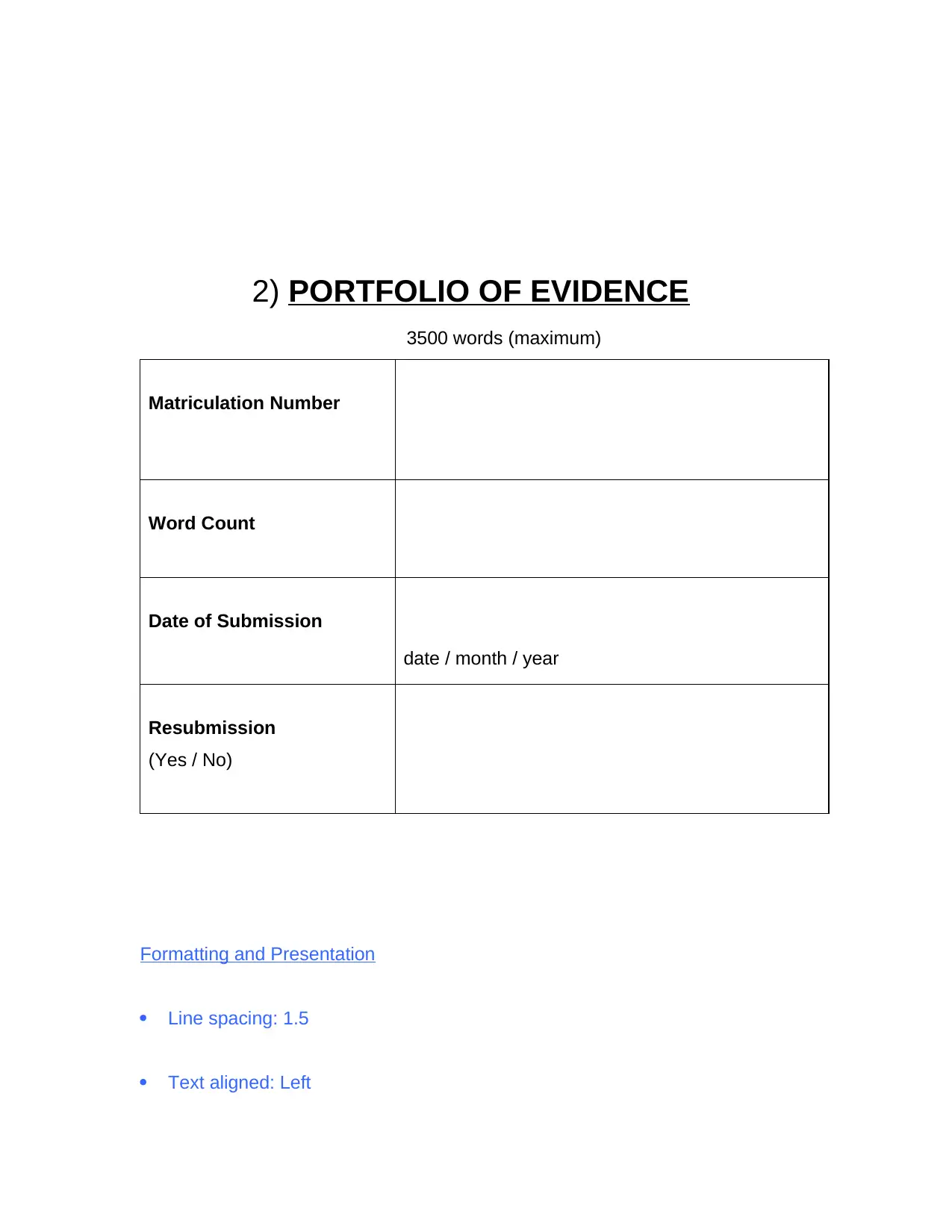
2) PORTFOLIO OF EVIDENCE
3500 words (maximum)
Matriculation Number
Word Count
Date of Submission
date / month / year
Resubmission
(Yes / No)
Formatting and Presentation
Line spacing: 1.5
Text aligned: Left
3500 words (maximum)
Matriculation Number
Word Count
Date of Submission
date / month / year
Resubmission
(Yes / No)
Formatting and Presentation
Line spacing: 1.5
Text aligned: Left
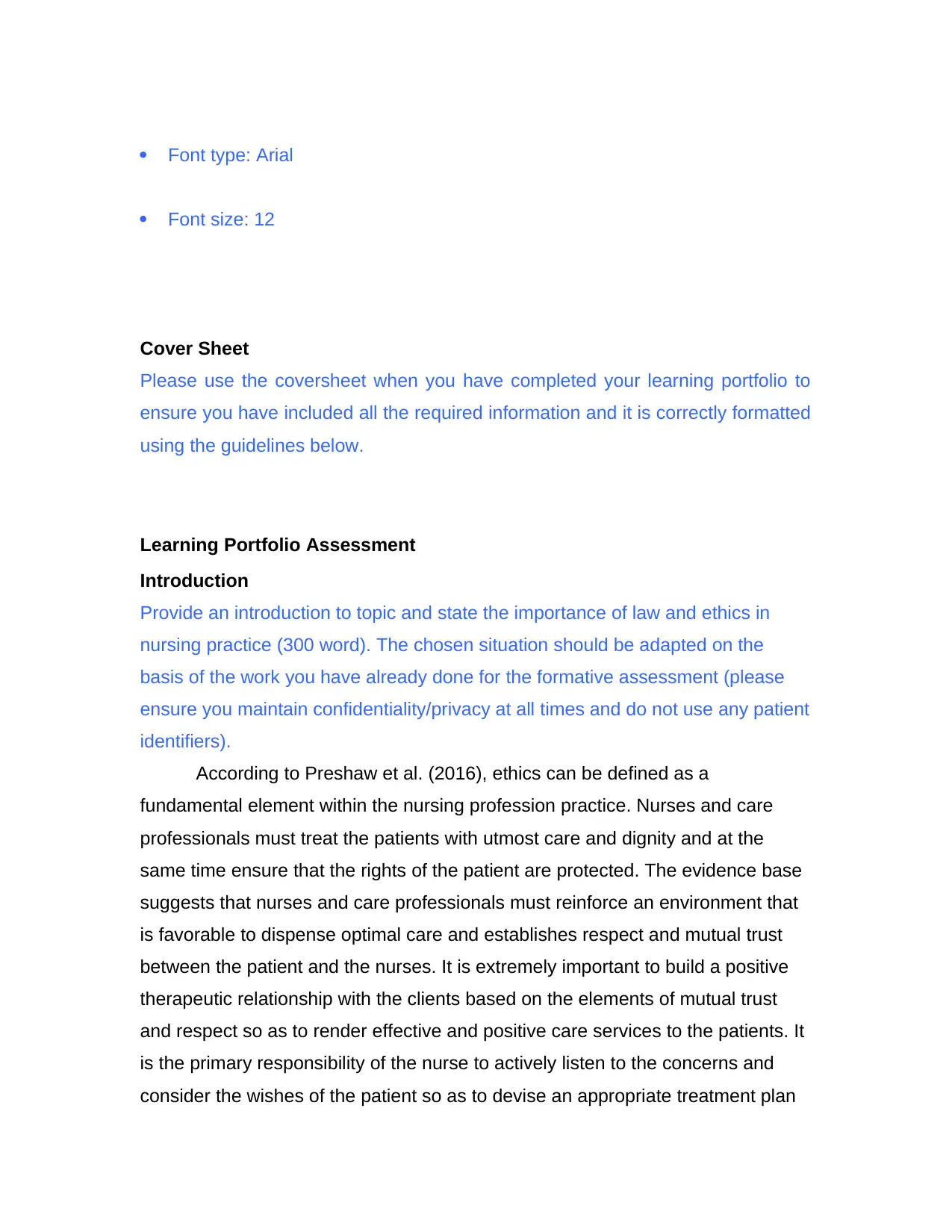
Font type: Arial
Font size: 12
Cover Sheet
Please use the coversheet when you have completed your learning portfolio to
ensure you have included all the required information and it is correctly formatted
using the guidelines below.
Learning Portfolio Assessment
Introduction
Provide an introduction to topic and state the importance of law and ethics in
nursing practice (300 word). The chosen situation should be adapted on the
basis of the work you have already done for the formative assessment (please
ensure you maintain confidentiality/privacy at all times and do not use any patient
identifiers).
According to Preshaw et al. (2016), ethics can be defined as a
fundamental element within the nursing profession practice. Nurses and care
professionals must treat the patients with utmost care and dignity and at the
same time ensure that the rights of the patient are protected. The evidence base
suggests that nurses and care professionals must reinforce an environment that
is favorable to dispense optimal care and establishes respect and mutual trust
between the patient and the nurses. It is extremely important to build a positive
therapeutic relationship with the clients based on the elements of mutual trust
and respect so as to render effective and positive care services to the patients. It
is the primary responsibility of the nurse to actively listen to the concerns and
consider the wishes of the patient so as to devise an appropriate treatment plan
Font size: 12
Cover Sheet
Please use the coversheet when you have completed your learning portfolio to
ensure you have included all the required information and it is correctly formatted
using the guidelines below.
Learning Portfolio Assessment
Introduction
Provide an introduction to topic and state the importance of law and ethics in
nursing practice (300 word). The chosen situation should be adapted on the
basis of the work you have already done for the formative assessment (please
ensure you maintain confidentiality/privacy at all times and do not use any patient
identifiers).
According to Preshaw et al. (2016), ethics can be defined as a
fundamental element within the nursing profession practice. Nurses and care
professionals must treat the patients with utmost care and dignity and at the
same time ensure that the rights of the patient are protected. The evidence base
suggests that nurses and care professionals must reinforce an environment that
is favorable to dispense optimal care and establishes respect and mutual trust
between the patient and the nurses. It is extremely important to build a positive
therapeutic relationship with the clients based on the elements of mutual trust
and respect so as to render effective and positive care services to the patients. It
is the primary responsibility of the nurse to actively listen to the concerns and
consider the wishes of the patient so as to devise an appropriate treatment plan
⊘ This is a preview!⊘
Do you want full access?
Subscribe today to unlock all pages.

Trusted by 1+ million students worldwide
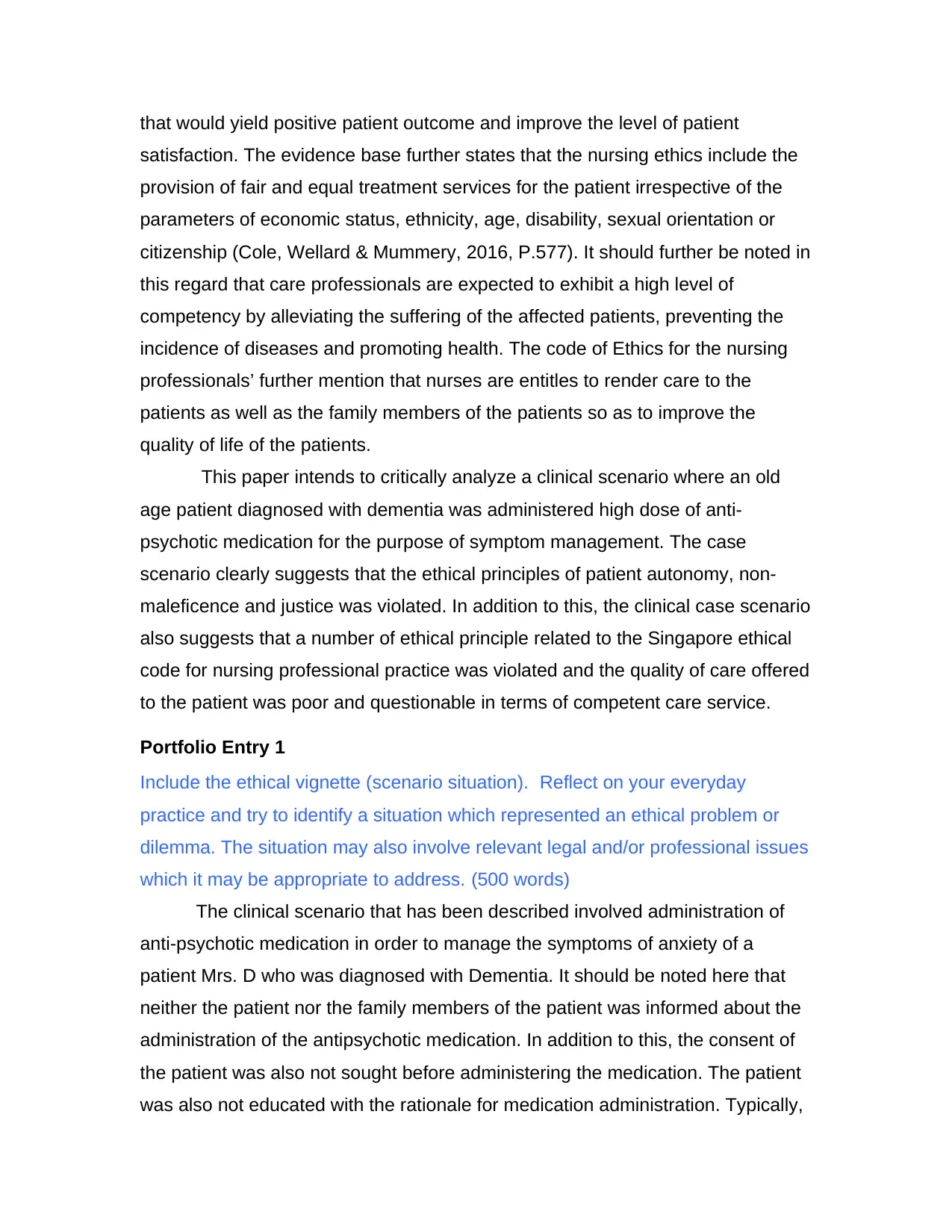
that would yield positive patient outcome and improve the level of patient
satisfaction. The evidence base further states that the nursing ethics include the
provision of fair and equal treatment services for the patient irrespective of the
parameters of economic status, ethnicity, age, disability, sexual orientation or
citizenship (Cole, Wellard & Mummery, 2016, P.577). It should further be noted in
this regard that care professionals are expected to exhibit a high level of
competency by alleviating the suffering of the affected patients, preventing the
incidence of diseases and promoting health. The code of Ethics for the nursing
professionals’ further mention that nurses are entitles to render care to the
patients as well as the family members of the patients so as to improve the
quality of life of the patients.
This paper intends to critically analyze a clinical scenario where an old
age patient diagnosed with dementia was administered high dose of anti-
psychotic medication for the purpose of symptom management. The case
scenario clearly suggests that the ethical principles of patient autonomy, non-
maleficence and justice was violated. In addition to this, the clinical case scenario
also suggests that a number of ethical principle related to the Singapore ethical
code for nursing professional practice was violated and the quality of care offered
to the patient was poor and questionable in terms of competent care service.
Portfolio Entry 1
Include the ethical vignette (scenario situation). Reflect on your everyday
practice and try to identify a situation which represented an ethical problem or
dilemma. The situation may also involve relevant legal and/or professional issues
which it may be appropriate to address. (500 words)
The clinical scenario that has been described involved administration of
anti-psychotic medication in order to manage the symptoms of anxiety of a
patient Mrs. D who was diagnosed with Dementia. It should be noted here that
neither the patient nor the family members of the patient was informed about the
administration of the antipsychotic medication. In addition to this, the consent of
the patient was also not sought before administering the medication. The patient
was also not educated with the rationale for medication administration. Typically,
satisfaction. The evidence base further states that the nursing ethics include the
provision of fair and equal treatment services for the patient irrespective of the
parameters of economic status, ethnicity, age, disability, sexual orientation or
citizenship (Cole, Wellard & Mummery, 2016, P.577). It should further be noted in
this regard that care professionals are expected to exhibit a high level of
competency by alleviating the suffering of the affected patients, preventing the
incidence of diseases and promoting health. The code of Ethics for the nursing
professionals’ further mention that nurses are entitles to render care to the
patients as well as the family members of the patients so as to improve the
quality of life of the patients.
This paper intends to critically analyze a clinical scenario where an old
age patient diagnosed with dementia was administered high dose of anti-
psychotic medication for the purpose of symptom management. The case
scenario clearly suggests that the ethical principles of patient autonomy, non-
maleficence and justice was violated. In addition to this, the clinical case scenario
also suggests that a number of ethical principle related to the Singapore ethical
code for nursing professional practice was violated and the quality of care offered
to the patient was poor and questionable in terms of competent care service.
Portfolio Entry 1
Include the ethical vignette (scenario situation). Reflect on your everyday
practice and try to identify a situation which represented an ethical problem or
dilemma. The situation may also involve relevant legal and/or professional issues
which it may be appropriate to address. (500 words)
The clinical scenario that has been described involved administration of
anti-psychotic medication in order to manage the symptoms of anxiety of a
patient Mrs. D who was diagnosed with Dementia. It should be noted here that
neither the patient nor the family members of the patient was informed about the
administration of the antipsychotic medication. In addition to this, the consent of
the patient was also not sought before administering the medication. The patient
was also not educated with the rationale for medication administration. Typically,
Paraphrase This Document
Need a fresh take? Get an instant paraphrase of this document with our AI Paraphraser
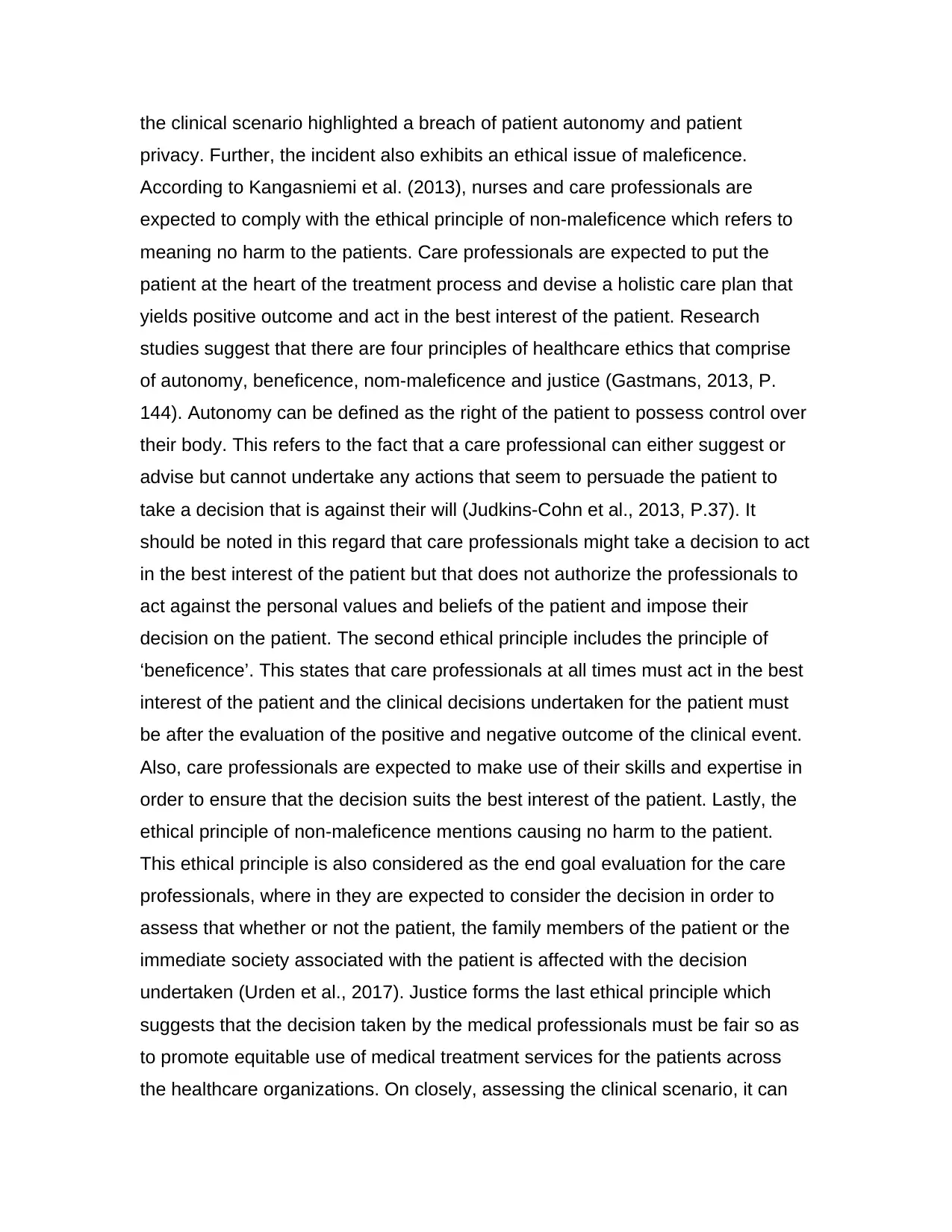
the clinical scenario highlighted a breach of patient autonomy and patient
privacy. Further, the incident also exhibits an ethical issue of maleficence.
According to Kangasniemi et al. (2013), nurses and care professionals are
expected to comply with the ethical principle of non-maleficence which refers to
meaning no harm to the patients. Care professionals are expected to put the
patient at the heart of the treatment process and devise a holistic care plan that
yields positive outcome and act in the best interest of the patient. Research
studies suggest that there are four principles of healthcare ethics that comprise
of autonomy, beneficence, nom-maleficence and justice (Gastmans, 2013, P.
144). Autonomy can be defined as the right of the patient to possess control over
their body. This refers to the fact that a care professional can either suggest or
advise but cannot undertake any actions that seem to persuade the patient to
take a decision that is against their will (Judkins-Cohn et al., 2013, P.37). It
should be noted in this regard that care professionals might take a decision to act
in the best interest of the patient but that does not authorize the professionals to
act against the personal values and beliefs of the patient and impose their
decision on the patient. The second ethical principle includes the principle of
‘beneficence’. This states that care professionals at all times must act in the best
interest of the patient and the clinical decisions undertaken for the patient must
be after the evaluation of the positive and negative outcome of the clinical event.
Also, care professionals are expected to make use of their skills and expertise in
order to ensure that the decision suits the best interest of the patient. Lastly, the
ethical principle of non-maleficence mentions causing no harm to the patient.
This ethical principle is also considered as the end goal evaluation for the care
professionals, where in they are expected to consider the decision in order to
assess that whether or not the patient, the family members of the patient or the
immediate society associated with the patient is affected with the decision
undertaken (Urden et al., 2017). Justice forms the last ethical principle which
suggests that the decision taken by the medical professionals must be fair so as
to promote equitable use of medical treatment services for the patients across
the healthcare organizations. On closely, assessing the clinical scenario, it can
privacy. Further, the incident also exhibits an ethical issue of maleficence.
According to Kangasniemi et al. (2013), nurses and care professionals are
expected to comply with the ethical principle of non-maleficence which refers to
meaning no harm to the patients. Care professionals are expected to put the
patient at the heart of the treatment process and devise a holistic care plan that
yields positive outcome and act in the best interest of the patient. Research
studies suggest that there are four principles of healthcare ethics that comprise
of autonomy, beneficence, nom-maleficence and justice (Gastmans, 2013, P.
144). Autonomy can be defined as the right of the patient to possess control over
their body. This refers to the fact that a care professional can either suggest or
advise but cannot undertake any actions that seem to persuade the patient to
take a decision that is against their will (Judkins-Cohn et al., 2013, P.37). It
should be noted in this regard that care professionals might take a decision to act
in the best interest of the patient but that does not authorize the professionals to
act against the personal values and beliefs of the patient and impose their
decision on the patient. The second ethical principle includes the principle of
‘beneficence’. This states that care professionals at all times must act in the best
interest of the patient and the clinical decisions undertaken for the patient must
be after the evaluation of the positive and negative outcome of the clinical event.
Also, care professionals are expected to make use of their skills and expertise in
order to ensure that the decision suits the best interest of the patient. Lastly, the
ethical principle of non-maleficence mentions causing no harm to the patient.
This ethical principle is also considered as the end goal evaluation for the care
professionals, where in they are expected to consider the decision in order to
assess that whether or not the patient, the family members of the patient or the
immediate society associated with the patient is affected with the decision
undertaken (Urden et al., 2017). Justice forms the last ethical principle which
suggests that the decision taken by the medical professionals must be fair so as
to promote equitable use of medical treatment services for the patients across
the healthcare organizations. On closely, assessing the clinical scenario, it can
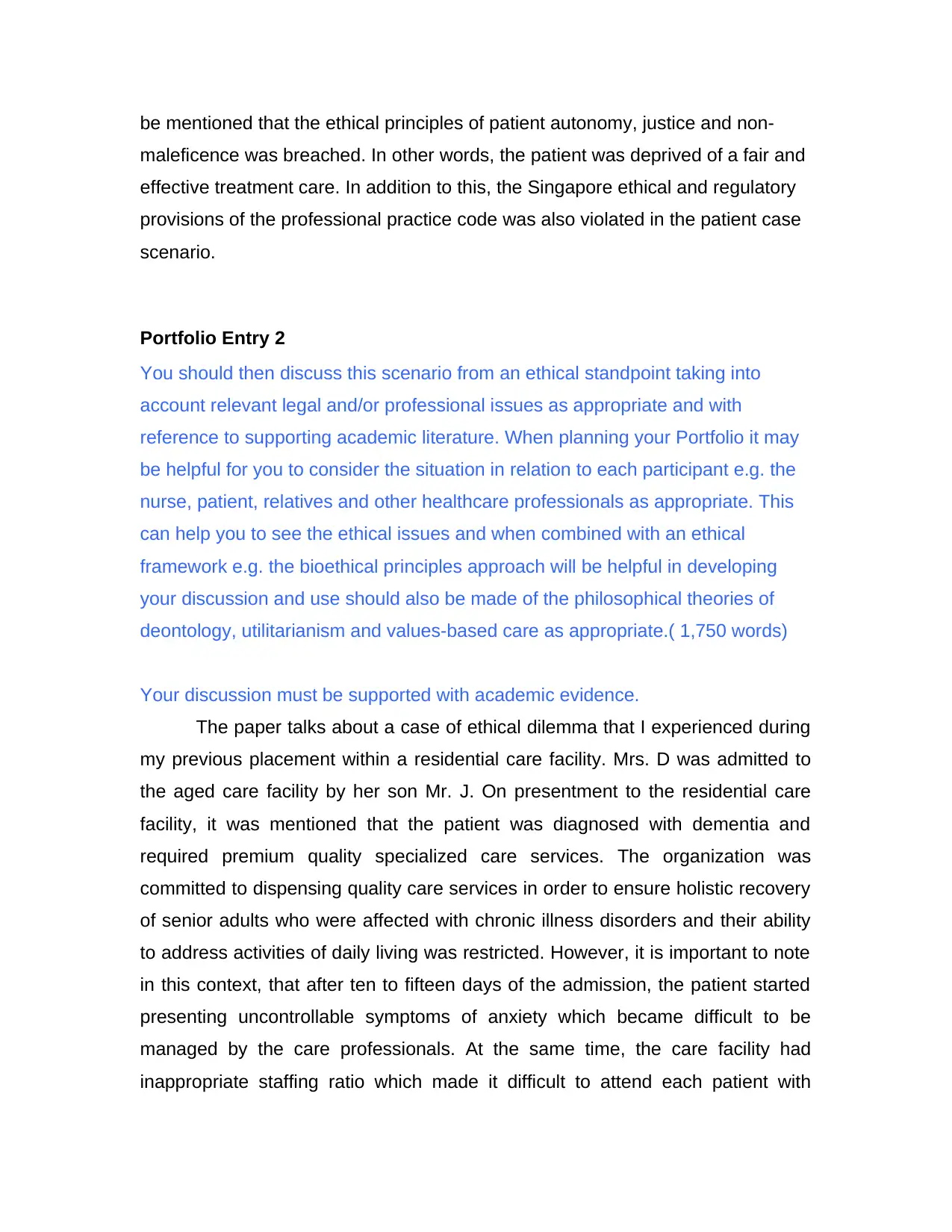
be mentioned that the ethical principles of patient autonomy, justice and non-
maleficence was breached. In other words, the patient was deprived of a fair and
effective treatment care. In addition to this, the Singapore ethical and regulatory
provisions of the professional practice code was also violated in the patient case
scenario.
Portfolio Entry 2
You should then discuss this scenario from an ethical standpoint taking into
account relevant legal and/or professional issues as appropriate and with
reference to supporting academic literature. When planning your Portfolio it may
be helpful for you to consider the situation in relation to each participant e.g. the
nurse, patient, relatives and other healthcare professionals as appropriate. This
can help you to see the ethical issues and when combined with an ethical
framework e.g. the bioethical principles approach will be helpful in developing
your discussion and use should also be made of the philosophical theories of
deontology, utilitarianism and values-based care as appropriate.( 1,750 words)
Your discussion must be supported with academic evidence.
The paper talks about a case of ethical dilemma that I experienced during
my previous placement within a residential care facility. Mrs. D was admitted to
the aged care facility by her son Mr. J. On presentment to the residential care
facility, it was mentioned that the patient was diagnosed with dementia and
required premium quality specialized care services. The organization was
committed to dispensing quality care services in order to ensure holistic recovery
of senior adults who were affected with chronic illness disorders and their ability
to address activities of daily living was restricted. However, it is important to note
in this context, that after ten to fifteen days of the admission, the patient started
presenting uncontrollable symptoms of anxiety which became difficult to be
managed by the care professionals. At the same time, the care facility had
inappropriate staffing ratio which made it difficult to attend each patient with
maleficence was breached. In other words, the patient was deprived of a fair and
effective treatment care. In addition to this, the Singapore ethical and regulatory
provisions of the professional practice code was also violated in the patient case
scenario.
Portfolio Entry 2
You should then discuss this scenario from an ethical standpoint taking into
account relevant legal and/or professional issues as appropriate and with
reference to supporting academic literature. When planning your Portfolio it may
be helpful for you to consider the situation in relation to each participant e.g. the
nurse, patient, relatives and other healthcare professionals as appropriate. This
can help you to see the ethical issues and when combined with an ethical
framework e.g. the bioethical principles approach will be helpful in developing
your discussion and use should also be made of the philosophical theories of
deontology, utilitarianism and values-based care as appropriate.( 1,750 words)
Your discussion must be supported with academic evidence.
The paper talks about a case of ethical dilemma that I experienced during
my previous placement within a residential care facility. Mrs. D was admitted to
the aged care facility by her son Mr. J. On presentment to the residential care
facility, it was mentioned that the patient was diagnosed with dementia and
required premium quality specialized care services. The organization was
committed to dispensing quality care services in order to ensure holistic recovery
of senior adults who were affected with chronic illness disorders and their ability
to address activities of daily living was restricted. However, it is important to note
in this context, that after ten to fifteen days of the admission, the patient started
presenting uncontrollable symptoms of anxiety which became difficult to be
managed by the care professionals. At the same time, the care facility had
inappropriate staffing ratio which made it difficult to attend each patient with
⊘ This is a preview!⊘
Do you want full access?
Subscribe today to unlock all pages.

Trusted by 1+ million students worldwide
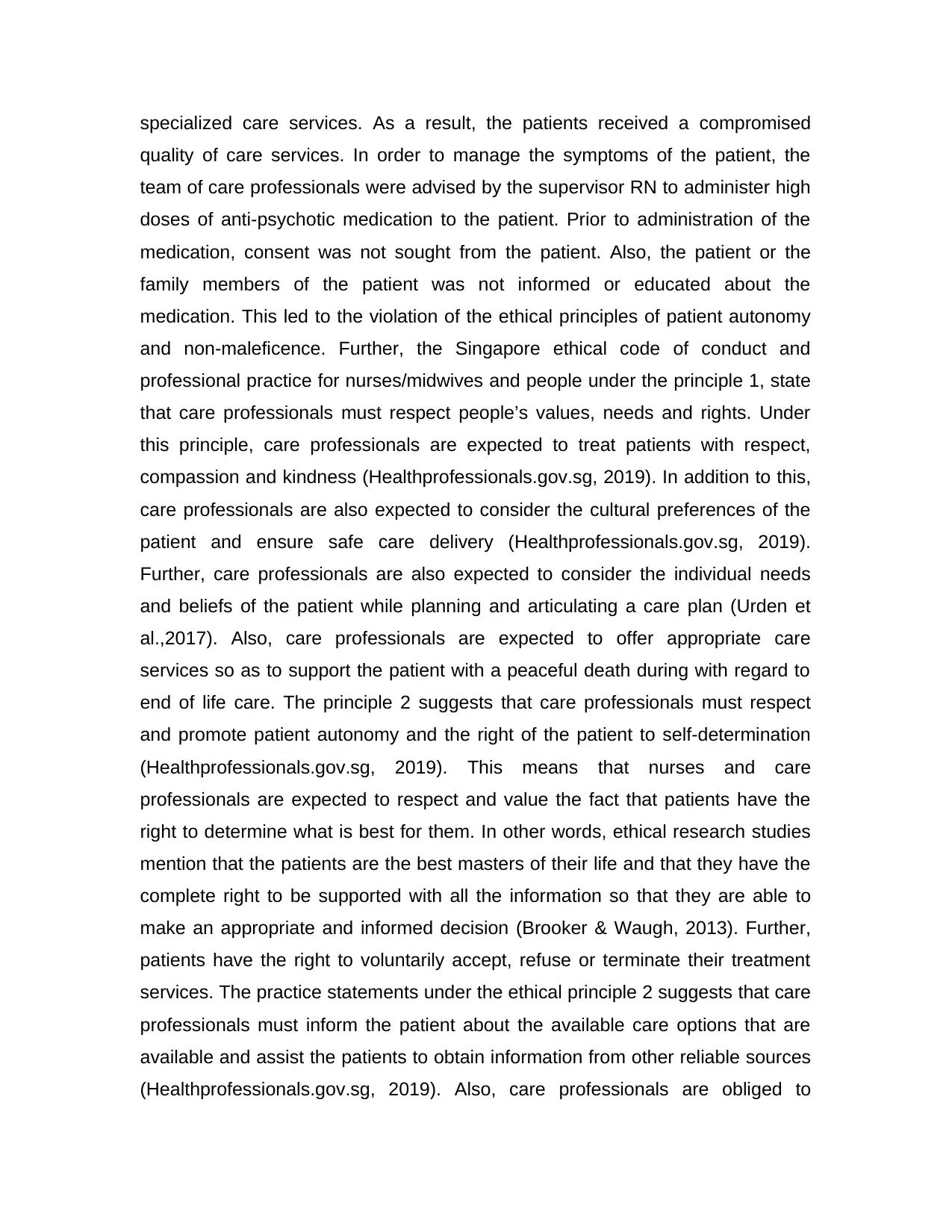
specialized care services. As a result, the patients received a compromised
quality of care services. In order to manage the symptoms of the patient, the
team of care professionals were advised by the supervisor RN to administer high
doses of anti-psychotic medication to the patient. Prior to administration of the
medication, consent was not sought from the patient. Also, the patient or the
family members of the patient was not informed or educated about the
medication. This led to the violation of the ethical principles of patient autonomy
and non-maleficence. Further, the Singapore ethical code of conduct and
professional practice for nurses/midwives and people under the principle 1, state
that care professionals must respect people’s values, needs and rights. Under
this principle, care professionals are expected to treat patients with respect,
compassion and kindness (Healthprofessionals.gov.sg, 2019). In addition to this,
care professionals are also expected to consider the cultural preferences of the
patient and ensure safe care delivery (Healthprofessionals.gov.sg, 2019).
Further, care professionals are also expected to consider the individual needs
and beliefs of the patient while planning and articulating a care plan (Urden et
al.,2017). Also, care professionals are expected to offer appropriate care
services so as to support the patient with a peaceful death during with regard to
end of life care. The principle 2 suggests that care professionals must respect
and promote patient autonomy and the right of the patient to self-determination
(Healthprofessionals.gov.sg, 2019). This means that nurses and care
professionals are expected to respect and value the fact that patients have the
right to determine what is best for them. In other words, ethical research studies
mention that the patients are the best masters of their life and that they have the
complete right to be supported with all the information so that they are able to
make an appropriate and informed decision (Brooker & Waugh, 2013). Further,
patients have the right to voluntarily accept, refuse or terminate their treatment
services. The practice statements under the ethical principle 2 suggests that care
professionals must inform the patient about the available care options that are
available and assist the patients to obtain information from other reliable sources
(Healthprofessionals.gov.sg, 2019). Also, care professionals are obliged to
quality of care services. In order to manage the symptoms of the patient, the
team of care professionals were advised by the supervisor RN to administer high
doses of anti-psychotic medication to the patient. Prior to administration of the
medication, consent was not sought from the patient. Also, the patient or the
family members of the patient was not informed or educated about the
medication. This led to the violation of the ethical principles of patient autonomy
and non-maleficence. Further, the Singapore ethical code of conduct and
professional practice for nurses/midwives and people under the principle 1, state
that care professionals must respect people’s values, needs and rights. Under
this principle, care professionals are expected to treat patients with respect,
compassion and kindness (Healthprofessionals.gov.sg, 2019). In addition to this,
care professionals are also expected to consider the cultural preferences of the
patient and ensure safe care delivery (Healthprofessionals.gov.sg, 2019).
Further, care professionals are also expected to consider the individual needs
and beliefs of the patient while planning and articulating a care plan (Urden et
al.,2017). Also, care professionals are expected to offer appropriate care
services so as to support the patient with a peaceful death during with regard to
end of life care. The principle 2 suggests that care professionals must respect
and promote patient autonomy and the right of the patient to self-determination
(Healthprofessionals.gov.sg, 2019). This means that nurses and care
professionals are expected to respect and value the fact that patients have the
right to determine what is best for them. In other words, ethical research studies
mention that the patients are the best masters of their life and that they have the
complete right to be supported with all the information so that they are able to
make an appropriate and informed decision (Brooker & Waugh, 2013). Further,
patients have the right to voluntarily accept, refuse or terminate their treatment
services. The practice statements under the ethical principle 2 suggests that care
professionals must inform the patient about the available care options that are
available and assist the patients to obtain information from other reliable sources
(Healthprofessionals.gov.sg, 2019). Also, care professionals are obliged to
Paraphrase This Document
Need a fresh take? Get an instant paraphrase of this document with our AI Paraphraser
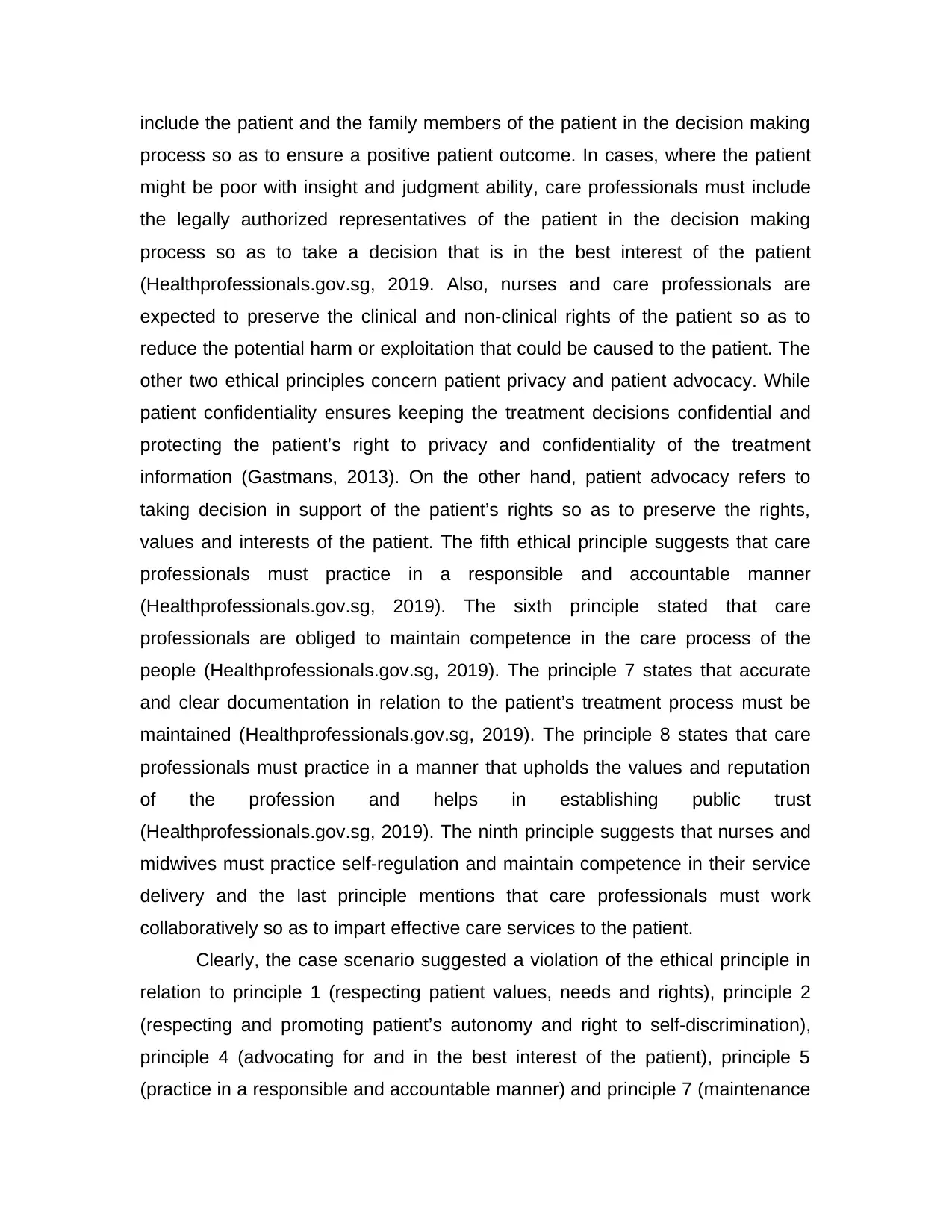
include the patient and the family members of the patient in the decision making
process so as to ensure a positive patient outcome. In cases, where the patient
might be poor with insight and judgment ability, care professionals must include
the legally authorized representatives of the patient in the decision making
process so as to take a decision that is in the best interest of the patient
(Healthprofessionals.gov.sg, 2019. Also, nurses and care professionals are
expected to preserve the clinical and non-clinical rights of the patient so as to
reduce the potential harm or exploitation that could be caused to the patient. The
other two ethical principles concern patient privacy and patient advocacy. While
patient confidentiality ensures keeping the treatment decisions confidential and
protecting the patient’s right to privacy and confidentiality of the treatment
information (Gastmans, 2013). On the other hand, patient advocacy refers to
taking decision in support of the patient’s rights so as to preserve the rights,
values and interests of the patient. The fifth ethical principle suggests that care
professionals must practice in a responsible and accountable manner
(Healthprofessionals.gov.sg, 2019). The sixth principle stated that care
professionals are obliged to maintain competence in the care process of the
people (Healthprofessionals.gov.sg, 2019). The principle 7 states that accurate
and clear documentation in relation to the patient’s treatment process must be
maintained (Healthprofessionals.gov.sg, 2019). The principle 8 states that care
professionals must practice in a manner that upholds the values and reputation
of the profession and helps in establishing public trust
(Healthprofessionals.gov.sg, 2019). The ninth principle suggests that nurses and
midwives must practice self-regulation and maintain competence in their service
delivery and the last principle mentions that care professionals must work
collaboratively so as to impart effective care services to the patient.
Clearly, the case scenario suggested a violation of the ethical principle in
relation to principle 1 (respecting patient values, needs and rights), principle 2
(respecting and promoting patient’s autonomy and right to self-discrimination),
principle 4 (advocating for and in the best interest of the patient), principle 5
(practice in a responsible and accountable manner) and principle 7 (maintenance
process so as to ensure a positive patient outcome. In cases, where the patient
might be poor with insight and judgment ability, care professionals must include
the legally authorized representatives of the patient in the decision making
process so as to take a decision that is in the best interest of the patient
(Healthprofessionals.gov.sg, 2019. Also, nurses and care professionals are
expected to preserve the clinical and non-clinical rights of the patient so as to
reduce the potential harm or exploitation that could be caused to the patient. The
other two ethical principles concern patient privacy and patient advocacy. While
patient confidentiality ensures keeping the treatment decisions confidential and
protecting the patient’s right to privacy and confidentiality of the treatment
information (Gastmans, 2013). On the other hand, patient advocacy refers to
taking decision in support of the patient’s rights so as to preserve the rights,
values and interests of the patient. The fifth ethical principle suggests that care
professionals must practice in a responsible and accountable manner
(Healthprofessionals.gov.sg, 2019). The sixth principle stated that care
professionals are obliged to maintain competence in the care process of the
people (Healthprofessionals.gov.sg, 2019). The principle 7 states that accurate
and clear documentation in relation to the patient’s treatment process must be
maintained (Healthprofessionals.gov.sg, 2019). The principle 8 states that care
professionals must practice in a manner that upholds the values and reputation
of the profession and helps in establishing public trust
(Healthprofessionals.gov.sg, 2019). The ninth principle suggests that nurses and
midwives must practice self-regulation and maintain competence in their service
delivery and the last principle mentions that care professionals must work
collaboratively so as to impart effective care services to the patient.
Clearly, the case scenario suggested a violation of the ethical principle in
relation to principle 1 (respecting patient values, needs and rights), principle 2
(respecting and promoting patient’s autonomy and right to self-discrimination),
principle 4 (advocating for and in the best interest of the patient), principle 5
(practice in a responsible and accountable manner) and principle 7 (maintenance
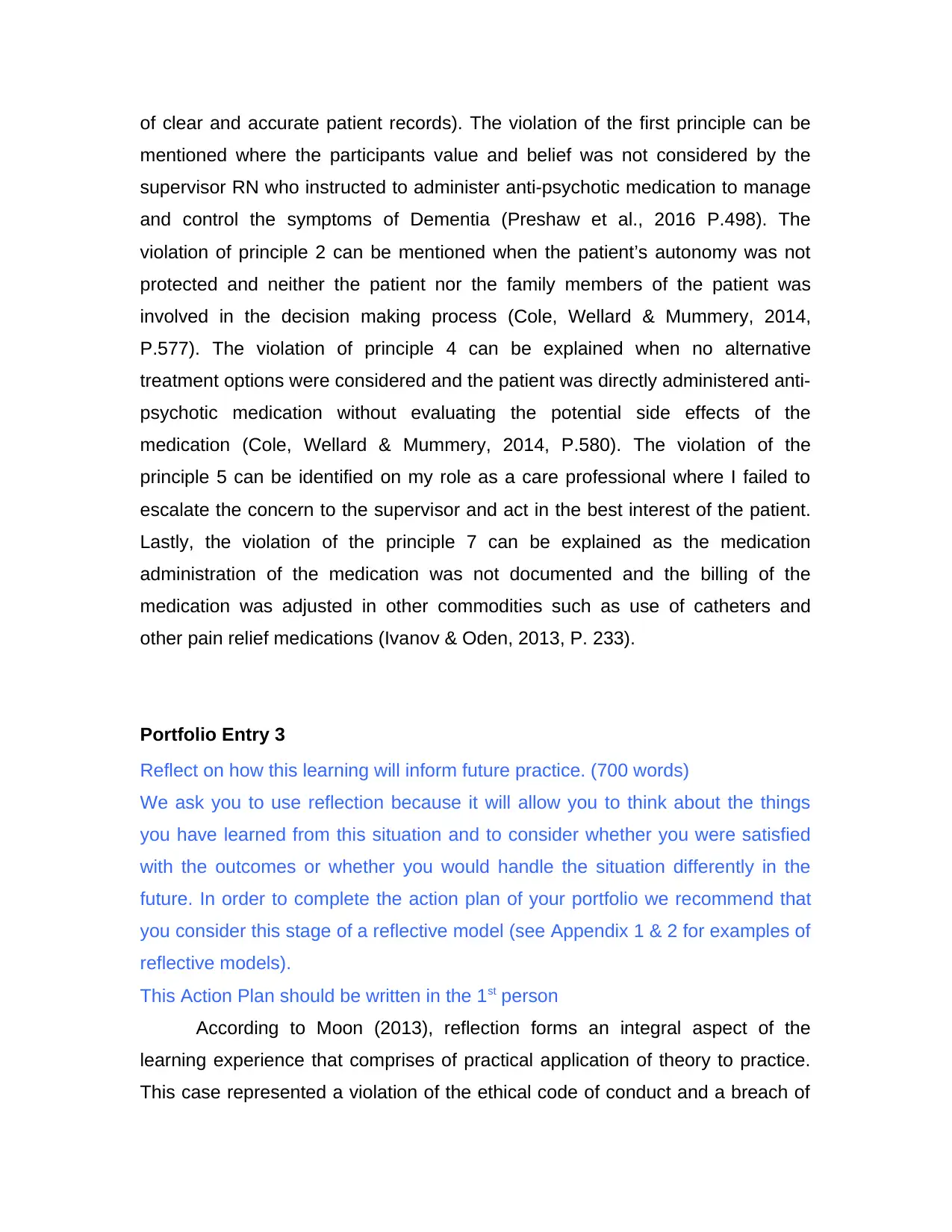
of clear and accurate patient records). The violation of the first principle can be
mentioned where the participants value and belief was not considered by the
supervisor RN who instructed to administer anti-psychotic medication to manage
and control the symptoms of Dementia (Preshaw et al., 2016 P.498). The
violation of principle 2 can be mentioned when the patient’s autonomy was not
protected and neither the patient nor the family members of the patient was
involved in the decision making process (Cole, Wellard & Mummery, 2014,
P.577). The violation of principle 4 can be explained when no alternative
treatment options were considered and the patient was directly administered anti-
psychotic medication without evaluating the potential side effects of the
medication (Cole, Wellard & Mummery, 2014, P.580). The violation of the
principle 5 can be identified on my role as a care professional where I failed to
escalate the concern to the supervisor and act in the best interest of the patient.
Lastly, the violation of the principle 7 can be explained as the medication
administration of the medication was not documented and the billing of the
medication was adjusted in other commodities such as use of catheters and
other pain relief medications (Ivanov & Oden, 2013, P. 233).
Portfolio Entry 3
Reflect on how this learning will inform future practice. (700 words)
We ask you to use reflection because it will allow you to think about the things
you have learned from this situation and to consider whether you were satisfied
with the outcomes or whether you would handle the situation differently in the
future. In order to complete the action plan of your portfolio we recommend that
you consider this stage of a reflective model (see Appendix 1 & 2 for examples of
reflective models).
This Action Plan should be written in the 1st person
According to Moon (2013), reflection forms an integral aspect of the
learning experience that comprises of practical application of theory to practice.
This case represented a violation of the ethical code of conduct and a breach of
mentioned where the participants value and belief was not considered by the
supervisor RN who instructed to administer anti-psychotic medication to manage
and control the symptoms of Dementia (Preshaw et al., 2016 P.498). The
violation of principle 2 can be mentioned when the patient’s autonomy was not
protected and neither the patient nor the family members of the patient was
involved in the decision making process (Cole, Wellard & Mummery, 2014,
P.577). The violation of principle 4 can be explained when no alternative
treatment options were considered and the patient was directly administered anti-
psychotic medication without evaluating the potential side effects of the
medication (Cole, Wellard & Mummery, 2014, P.580). The violation of the
principle 5 can be identified on my role as a care professional where I failed to
escalate the concern to the supervisor and act in the best interest of the patient.
Lastly, the violation of the principle 7 can be explained as the medication
administration of the medication was not documented and the billing of the
medication was adjusted in other commodities such as use of catheters and
other pain relief medications (Ivanov & Oden, 2013, P. 233).
Portfolio Entry 3
Reflect on how this learning will inform future practice. (700 words)
We ask you to use reflection because it will allow you to think about the things
you have learned from this situation and to consider whether you were satisfied
with the outcomes or whether you would handle the situation differently in the
future. In order to complete the action plan of your portfolio we recommend that
you consider this stage of a reflective model (see Appendix 1 & 2 for examples of
reflective models).
This Action Plan should be written in the 1st person
According to Moon (2013), reflection forms an integral aspect of the
learning experience that comprises of practical application of theory to practice.
This case represented a violation of the ethical code of conduct and a breach of
⊘ This is a preview!⊘
Do you want full access?
Subscribe today to unlock all pages.

Trusted by 1+ million students worldwide
1 out of 22
Related Documents
Your All-in-One AI-Powered Toolkit for Academic Success.
+13062052269
info@desklib.com
Available 24*7 on WhatsApp / Email
![[object Object]](/_next/static/media/star-bottom.7253800d.svg)
Unlock your academic potential
Copyright © 2020–2026 A2Z Services. All Rights Reserved. Developed and managed by ZUCOL.




